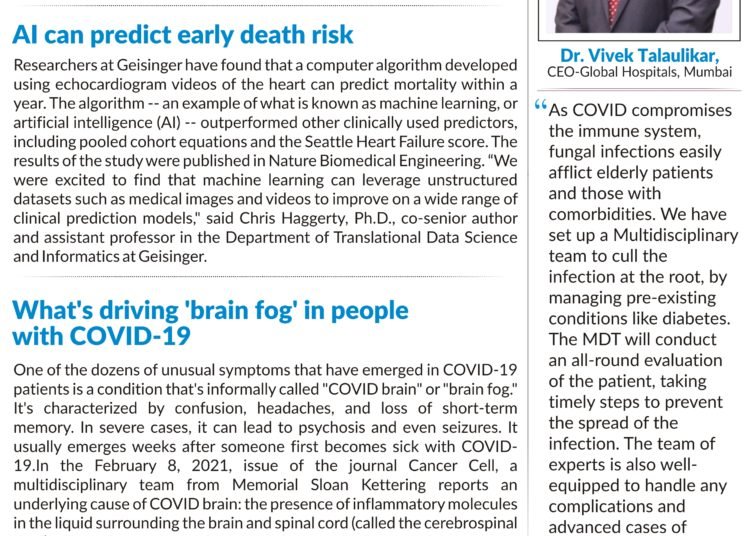Rx – Recipere

Dr. Vivek Talaulikar, CEO-Global Hospitals, Mumbai
“As COVID compromises the immune system, fungal infections easily afflict elderly patients and those with comorbidities. We have set up a Multidisciplinary team to cull the infection at the root, by managing pre-existing conditions like diabetes. The MDT will conduct an all-round evaluation of the patient, taking timely steps to prevent the spread of the infection. The team of experts is also well-equipped to handle any complications and advanced cases of invasive fungal infections.”
Childhood diet has lifelong impact
Eating too much fat and sugar as a child can alter your microbiome for life, even if you later learn to eat healthier, a new study in mice suggests. The study by UC Riverside researchers is one of the first to show a significant decrease in the total number and diversity of gut bacteria in mature mice fed an unhealthy diet as juveniles. “We studied mice, but the effect we observed is equivalent to kids having a Western diet, high in fat and sugar and their gut microbiome still being affected up to six years after puberty,” explained UCR evolutionary physiologist Theodore Garland. A paper describing the study has recently been published in the Journal of Experimental Biology.
AI can predict early death risk
Researchers at Geisinger have found that a computer algorithm developed using echocardiogram videos of the heart can predict mortality within a year. The algorithm — an example of what is known as machine learning, or artificial intelligence (AI) — outperformed other clinically used predictors, including pooled cohort equations and the Seattle Heart Failure score. The results of the study were published in Nature Biomedical Engineering.
“We were excited to find that machine learning can leverage unstructured datasets such as medical images and videos to improve on a wide range of clinical prediction models,” said Chris Haggerty, Ph.D., co-senior author and assistant professor in the Department of Translational Data Science and Informatics at Geisinger.
What’s driving ‘brain fog’ in people with COVID-19
One of the dozens of unusual symptoms that have emerged in COVID-19 patients is a condition that’s informally called “COVID brain” or “brain fog.” It’s characterized by confusion, headaches, and loss of short-term memory. In severe cases, it can lead to psychosis and even seizures. It usually emerges weeks after someone first becomes sick with COVID-19.In the February 8, 2021, issue of the journal Cancer Cell, a multidisciplinary team from Memorial Sloan Kettering reports an underlying cause of COVID brain: the presence of inflammatory molecules in the liquid surrounding the brain and spinal cord (called the cerebrospinal fluid). The findings suggest that anti-inflammatory drugs, such as steroids, may be useful for treating the condition, but more research is needed.
How SARS-CoV-2 mutates to escape antibody binding
A scientific detective story unearths how SARS-CoV-2 evolves new variants that evade antibodies. In a recurring pattern of evolution, SARS-CoV-2 evades immune responses by selectively deleting small bits of its genetic sequence, according to new research from the University of Pittsburgh School of Medicine.
Since these deletions happen in a part of the sequence that encodes for the shape of the spike protein, the formerly neutralizing antibody can’t grab hold of the virus, the researchers report today in Science. And because the molecular “proofreader” that usually catches errors during SARS-CoV-2 replication is “blind” to fixing deletions, they become cemented into the variant’s genetic material.

Subscribe on WhatsApp & Telegram to receive real time updates
Follow Health In Five on LinkedIn, Facebook, Twitter & Instagram










































